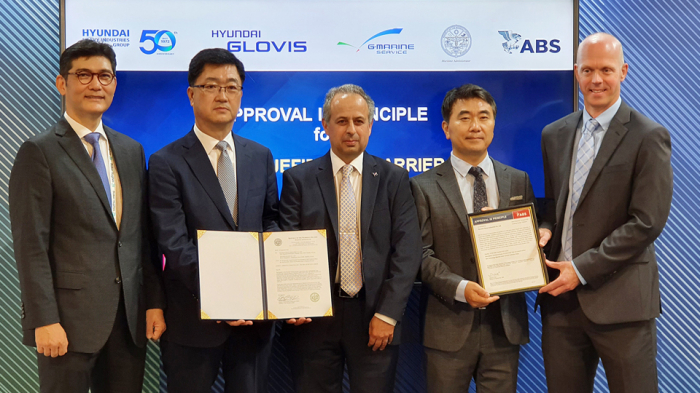Shipping & Shipbuilding
Hyundai Glovis takes first step for liquefied CO2 carrier
ABS and the Marshall Islands grant AiP for a 74,000-cubic-meter LCO2 carrier jointly developed by Hyundai Glovis and Hyundai Heavy
By Sep 06, 2022 (Gmt+09:00)
2
Min read
Most Read
LG Chem to sell water filter business to Glenwood PE for $692 million


Kyobo Life poised to buy Japan’s SBI Group-owned savings bank


KT&G eyes overseas M&A after rejecting activist fund's offer


StockX in merger talks with Naver’s online reseller Kream


Mirae Asset to be named Korea Post’s core real estate fund operator



South Korea’s Hyundai Glovis Co. has taken the first step in developing the world’s largest liquefied carbon dioxide (LCO2) carrier used to transport greenhouse gasses in the form of liquid for reuse or disposal as the company targets the fast-growing global carbon capture, utilization and storage market.
The logistics unit of South Korea’s top carmaker Hyundai Motor Group said on Tuesday that the American Bureau of Shipping (ABS) and the Republic of the Marshall Islands have granted approval in principle (AiP) for a 74,000-cubic-meter LCO2 carrier the company is jointly developing with Hyundai Heavy Industries Group.
During the AiP process, official institutions certify the suitability, stability and effectiveness of technology for a ship at an early stage of its development. Approval by ABS, a marine assets classification service provider, and the Marshall Islands, a hub for international shipping and vessel registries, is regarded as the international standard for vessel technologies.
The ship will be the world’s largest once it is manufactured as Hyundai Glovis and Hyundai Heavy Industries Group, the world’s No.1 shipbuilder, expect the carrier, equipped with a liquefied natural gas engine, to be 284 meters long and 42 meters wide.
“Through the world’s biggest LCO2 carrier, we will participate in the effort for carbon neutrality as a global shipping company,” said a Hyundai Glovis official. “We will also secure competitiveness in the future eco-friendly maritime logistics market based on direct verification of economic feasibility and safety.”
CARBON NEUTRALITY MUST-HAVE
An LCO2 carrier is a necessity for carbon neutrality since it transports CO2 before permanently burying the gas emitted from fossil fuels in the ground or reusing it in oil fields.
Hyundai Glovis provided Hyundai Heavy Industries Group with information on LCO2 transportation such as ports that are suitable for CO2 loading, and conditions of those harbors to help the shipbuilder reflect the data into the ship design.
Korea Shipbuilding & Offshore Engineering Co. (KSOE), the group’s intermediate holding company, and Hyundai Heavy Industries Co., a group subsidiary, applied advanced technologies to stably keep LCO2 and maximized the carrying capacity when they designed the vessel.
In June, the group agreed with Hyundai Glovis, ABS, the Marshall Islands and ship management firm G-Marine Service Co. to jointly develop the carrier.
Write to Han-Shin Park at phs@hankyung.com
Jongwoo Cheon edited this article.
More to Read
-
 Shipping & ShipbuildingHyundai Heavy, Glovis to make world's largest liquefied CO2 carrier
Shipping & ShipbuildingHyundai Heavy, Glovis to make world's largest liquefied CO2 carrierJun 07, 2022 (Gmt+09:00)
2 Min read
Comment 0
LOG IN


